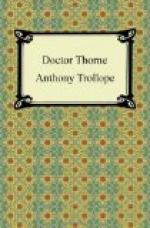There is a great difference in Whigs. Lord de Courcy was a Court Whig, following the fortunes, and enjoying, when he could get it, the sunshine of the throne. He was a sojourner at Windsor, and a visitor at Balmoral. He delighted in gold sticks, and was never so happy as when holding some cap of maintenance or spur of precedence with due dignity and acknowledged grace in the presence of all the Court. His means had been somewhat embarrassed by early extravagance; and, therefore, as it was to his taste to shine, it suited him to shine at the cost of the Court rather than at his own.
The Duke of Omnium was a Whig of a very different calibre. He rarely went near the presence of majesty, and when he did so, he did it merely as a disagreeable duty incident to his position. He was very willing that the Queen should be queen so long as he was allowed to be Duke of Omnium. Nor had he begrudged Prince Albert any of his honours till he was called Prince Consort. Then, indeed, he had, to his own intimate friends, made some remark in three words not flattering to the discretion of the Prime Minister. The Queen might be queen so long as he was Duke of Omnium. Their revenues were about the same, with the exception, that the duke’s were his own, and he could do what he liked with them. This remembrance did not unfrequently present itself to the duke’s mind. In person, he was a plain, thin man, tall, but undistinguished in appearance, except that there was a gleam of pride in his eye which seemed every moment to be saying, ’I am the Duke of Omnium’. He was unmarried, and, if report said true, a great debauchee; but if so he had always kept his debaucheries decently away from the eyes of the world, and was not, therefore, open to that loud condemnation which should fall like a hailstorm round the ears of some more open sinners.
Why these two mighty nobles put their heads together in order that the tailor’s son should represent Barchester in Parliament, I cannot explain. Mr Moffat, was, as has been said, Lord de Courcy’s friend; and it may be that Lord de Courcy was able to repay the duke for his kindness, as touching Barchester, with some little assistance in the county representation.
The next arrival was that of the Bishop of Barchester. A meek, good, worthy man, much attached to his wife, and somewhat addicted to his ease. She, apparently, was made in a different mould, and by her energy and diligence atoned for any want of those qualities which might be observed in the bishop himself. When asked his opinion, his lordship would generally reply by saying—’Mrs Proudie and I think so and so.’ But before that opinion was given, Mrs Proudie would take up the tale, and she, in her more concise manner, was not wont to quote the bishop as having at all assisted in the consideration of the subject. It was well known in Barsetshire that no married pair consorted more closely or more tenderly together; and the example of such conjugal affection among persons in the upper classes is worth mentioning, as it is believed by those below them, and too often with truth, that the sweet bliss of connubial reciprocity is not so common as it should be among the magnates of the earth.




